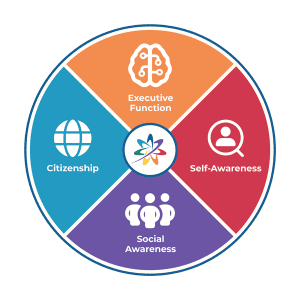Lots of grownups have taken to journaling for its emotional and mental benefits. But journaling can also have positive impacts for early writers, too!
Along with capturing moods and memories, keeping a journal can help people (big and small alike) feel better. According to Dr. Jeremy Sutton [1] journaling has these effects:
- Boosting emotional regulation
- Lowering stress
- Increasing awareness and mindfulness
Researchers also found that journaling shows physical health benefits. Better immune systems, blood pressure, and memory are some examples, according to Intermountain Health. [2]
Not sure where to get your children started? Here are some sample journal prompts. They’re broken down by themes to encourage creativity and growth.
🙂 Write All About Me
These prompts can help encourage self-awareness, goal-setting, and personal expression.
1. What is your favorite memory? Why is it so special to you?
2. What is your favorite thing about yourself? What’s one thing you want to work on?
3. What are three things you’re grateful for?
4. What is one mistake you made today? What did you learn from it?
5. Write about one goal you’ve reached that you’re proud of.
💭 Use My Imagination
Young writers will dream big and exercise their imaginations with these prompts.
6. If you could have any superpower, which one would you choose? What would you do with it?
7. If you could have any pet in the world (even a magical creature!), what would you want to have? What name would you give it?
8. Pretend you are an astronaut who has just landed on Mars. What do you think you would see?
9. What would you do if you were the main character in your favorite fairy tale?
10. Pretend that you could either shrink down as small as a mouse or grow as big as a building. What would you do and why?
😌 Know My Feelings & Explore Mindfulness
Use these prompts when you want to promote your children’s emotional intelligence, gratitude, and coping strategies.
11. What is one thing that helps you when you’re worried?
12. When you get mad or grumpy, what’s one thing that helps you calm down?
13. What is one thing about today that surprised you?
14. Think about one person who makes you feel loved. How do they show you that they care?
15. What is one thing you’re excited about? Why?
🌎 Explore The World Around Me
These writing prompts help children observe, explore, and appreciate their environment.
16. Look out of your window. What do you see?
17. What’s your favorite thing to do when you’re outside?
18. Would you rather it always be summer, spring, fall, or winter? Why?
19. Close your eyes and listen to the world around you. What sounds do you hear? Write them down.
20. What’s the best way to spend a rainy day?
🏘️ Know My Community
You can encourage empathy, connection, and appreciation for others with these five prompts.
21. Who is one person that you look up to and why?
22. Think about a friend or family member. What do you admire about them?
23. Do you have a favorite teacher? What are they like, and what’s the best thing they’ve taught you?
24. What do you love about your family?
25. Write down three ways you could help a friend or family member today.
Explore More For Early Growth
Developing a healthy social and emotional mindset is an important part of growing up, and journaling is just one way to build those skills. Through fun activities, engaging videos, and hands-on learning, children can strengthen confidence, resilience, and empathy every day.
Waterford offers many ways to help families and educators nurture these skills at home and in the classroom, supporting the whole child for lifelong success.
Journaling is just one way to help children build a healthy mindset. Explore more activities from Waterford that strengthen confidence, resilience, and social-emotional skills at home and in the classroom.
Explore Waterford Early Learning
Sources:
1. Sutton, Jeremy, PhD. “5 Benefits of Journaling for Mental Health,” PositivePsychology.com. May 14, 2018. https://positivepsychology.com/benefits-of-journaling/
2. Bailey, K. “5 Powerful Health Benefits of Journaling.” Intermountain Healthcare. July 5, 2018. https://intermountainhealthcare.org/blogs/topics/live-well/2018/07/5-powerful-health-benefits-of-journaling/



